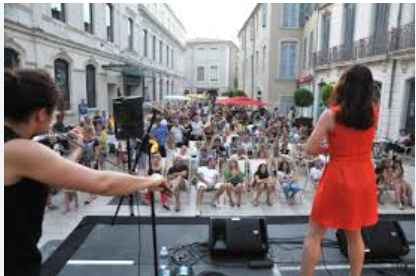La Fête de la Musique, also known globally as World Music Day, is one of the most iconic cultural festivals celebrated annually on June 21st. Originally founded in France, this vibrant event unites musicians and audiences across cities, continents, and genres. The phrase la fête de la musique translates to “the celebration of music,” and that is precisely what the day embodies: a worldwide tribute to the universal language of music, from street performances to grand concerts.
Whether you call it World Music Day or Music Festival Day, the heart of the event remains the same a free, inclusive celebration for both amateur and professional musicians. This article explores the origin, evolution, global reach, and local impact of la fête de la musique, offering everything you need to know about this spectacular international music movement.
📊 La Fête de la Musique Quick Facts
| Feature | Description |
|---|---|
| Name | La Fête de la Musique (World Music Day) |
| Origin | France (1982), initiated by Jack Lang (then Minister of Culture) |
| Date | June 21 every year |
| Participation | Over 120 countries and 1,000+ cities globally |
| Purpose | Free live music celebration open to all genres and musicians |
| Synonyms | Music Day, World Music Festival, Music Celebration Day |
| Official Website | fetedelamusique.culture.gouv.fr |
| Wikipedia Reference | Fête de la Musique – Wikipedia |
🎶 The Origins of La Fête de la Musique
La Fête de la Musique began in 1982, a brainchild of Jack Lang, the then French Minister of Culture, and Maurice Fleuret, Director of Music and Dance. The concept was simple yet revolutionary: offer a platform where anyone, regardless of skill level, could go out and perform music in public spaces for free.
Inspired by a study revealing that five million people in France played a musical instrument, the initiative aimed to bring music to the streets. The first edition, held on June 21, 1982, was a resounding success, marking the beginning of an annual tradition that would eventually grow into a global phenomenon.
Quote from Jack Lang:
“Music should be everywhere but not imposed anywhere.”
🌍 How La Fête de la Musique Became a Global Festival
What started as a French experiment now spans over 120 countries, from Germany to India, the United States to Nigeria. Cities like Berlin, New York, Lagos, London, and Mumbai host elaborate events that transform streets, parks, and buildings into temporary stages.
Musicians across all styles classical, pop, reggae, jazz, electronic, traditional, and more perform on sidewalks, balconies, cafes, rooftops, and public squares. Cultural institutions, embassies, and music schools also organize collaborative performances, enhancing cultural exchange.
This democratization of music reflects the event’s central values:
-
Free Access
-
Non-commercial Purpose
-
Open Participation
🎤 Why La Fête de la Musique Matters Today
In a world often divided by politics, race, language, and economics, la fête de la musique remains a unifying force. It celebrates diversity, inclusiveness, creativity, and the freedom of artistic expression. Here’s why the celebration continues to matter:
-
Empowers young and amateur musicians
-
Bridges cultural gaps through sound
-
Revives public spaces with community engagement
-
Promotes mental well-being through music therapy
From schools to prisons, refugee camps to luxury hotels, the impact of this festival is far-reaching.
📅 How to Participate in La Fête de la Musique
You don’t have to be a professional to join. Here are simple ways to participate:
🎧 As a Listener:
-
Attend local concerts or street performances
-
Watch live streams or broadcasts
-
Join musical parades or open-air dance events
🎸 As a Performer:
-
Register your performance on official or community platforms
-
Collaborate with friends for a local show
-
Host a rooftop or backyard mini-concert
Tip: Always check your local city’s guidelines or national Ministry of Culture announcements.
🌐 Countries and Cities with Iconic Fête de la Musique Celebrations
| Country | Major Cities Involved | Unique Features |
|---|---|---|
| France | Paris, Marseille, Lyon | Origin country with orchestras in public spaces |
| Germany | Berlin, Cologne | Techno to classical – a complete mix |
| USA | New York, San Francisco | Jazz festivals, school band contests |
| India | Mumbai, Delhi, Chennai | Bollywood mashups with folk and classical |
| Nigeria | Lagos, Abuja, Port Harcourt | Afrobeat, Gospel, and youth empowerment events |
🎧 La Fête de la Musique and Modern Technology
The 21st century has enhanced the experience through:
-
Live Streaming: Platforms like YouTube, Facebook, and Twitch air events globally.
-
AR/VR Integration: Some festivals offer immersive experiences using virtual stages.
-
Social Media Campaigns: Hashtags like #WorldMusicDay or #FêteDeLaMusique trend every June 21.
Digital tools have extended accessibility, especially post-pandemic, ensuring the show always goes on.
💡 Interesting Facts About La Fête de la Musique
-
It always falls on June 21, coinciding with the summer solstice.
-
UNESCO has lauded it as a “model for cultural democracy.”
-
Some cities have silent discos with wireless headphones.
-
Over 1,000 cities now participate every year.
-
It has inspired similar events like Make Music Day in the U.S.
🔗 Recommended Internal Link
Explore more global celebrations and cultural experiences on our guide:
👉 100percentsurewins.com — Top International Events to Watch
❓ FAQs About La Fête de la Musique
1. What is La Fête de la Musique?
La Fête de la Musique, or World Music Day, is an annual music celebration held on June 21. It encourages musicians of all skill levels to perform in public for free, promoting global cultural unity.
2. Who founded La Fête de la Musique?
It was founded in 1982 by French Minister of Culture Jack Lang and Maurice Fleuret.
3. Is it celebrated only in France?
No. Today, over 120 countries across the world celebrate it, including the United States, India, Nigeria, Germany, and more.
4. Can anyone perform during La Fête de la Musique?
Yes. The festival is open to all musicians — amateurs and professionals alike — with no restrictions on genre or background.
5. Is there a fee to attend or perform?
No. Events are free, non-commercial, and open to the public.
6. How does it differ from traditional music festivals?
Unlike ticketed commercial music festivals, La Fête de la Musique emphasizes community participation, accessibility, and the joy of sharing music for free.
📚 External Reference
-
For a deeper understanding of the origins and significance of this cultural phenomenon, see:
👉 Fête de la Musique – Wikipedia
✅ Conclusion: Why You Should Join the Music Revolution
La Fête de la Musique isn’t just a festival, it’s a global expression of unity, joy, and freedom through music. Whether you’re singing on a street corner in Lagos, strumming your guitar in Paris, or attending a rooftop gig in New York, you’re part of something bigger.
On June 21, don’t just watch participate. Celebrate the beauty of sound, the power of rhythm, and the connection music brings to humanity.


